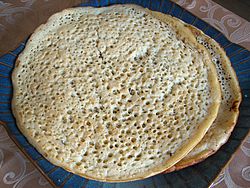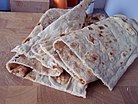Lahoh
 | |
| Alternative names | Lahuh, Laxoox, Canjeero, and Canjeelo |
|---|---|
| Type | Flatbreads/Pancake |
| Place of origin | Somalia |
| Region or state | Somalia,Djibouti, Ethiopia, and Yemen |
| Main ingredients | Plain flour, sorghum flour, self-rising flour, white corn flour, water, yeast, salt |
| Variations | Cambaabur Laxoox Abu-Beed |
 |
| Part of a series on |
| Arab cuisine |
|---|
Lahoh (Somali: laxoox 𐒐𐒖𐒄𐒝𐒄 or canjeero 𐒋𐒖𐒒𐒃𐒜𐒇𐒙, Hebrew: לַחוּח [lɑħɔħ]), also laḥūḥ (Arabic: لحوح), meaning "flat" in Arabic from the Arabic root word "lowh" ("لوح"), is a spongy, flat pancake-like bread that originated from Somalia.[1] It is a type of flat bread eaten regularly in Somalia, Djibouti, Ethiopia and Yemen. Yemenite Jewish immigrants popularized the dish in Israel.[2] It is called Laxoox/Lahoh or Canjeero in Somaliland, Somalia and Djibouti, and called Lahoh/Lahuh in Yemen, respectively.
Preparation[edit]
Lahoh is prepared from a dough of plain flour, self-raising flour, warm water, yeast, and a pinch of salt. The mixture is beaten by hand until soft and creamy.[3] Sorghum is the preferred flour for making lahoh. There is a sweet-tasting variety of the dish, as well as another variety that is made with eggs.[1]
Lahoh is traditionally baked on a metallic circular stove called a taawa. Lacking that, it can also be baked in an ordinary pan.
Regional consumption[edit]
In Somalia, Somaliland, Djibouti, and in parts of Ethiopia and Kenya, lahoh is usually eaten with a stew, soup, or curry. It is mostly eaten with subag (a Somali butter/ghee), olive oil, sesame oil, and sugar or honey. It is almost always consumed with Somali tea.[1]
In Yemen, it is often sold on the street by peddlers.[4] It can also be found in Israel, where it was introduced by Yemenite Jews who immigrated there.[5]
See also[edit]
References[edit]
- ^ a b c Mohamed Diriye Abdullahi, Culture and Customs of Somalis, (Greenwood Press: 2001), p. 113.
- ^ "Yemenite lahoh" in www.deliciousisrael.com
- ^ Preparing Lahoh
- ^ Dholas and other straw hats come into season Archived 2012-03-08 at archive.today
- ^ Hatikva market — the other side of Tel Aviv Archived 2015-04-27 at the Wayback Machine
External links[edit]
 |
| Part of a series on |
| Arab cuisine |
|---|

No comments:
Post a Comment